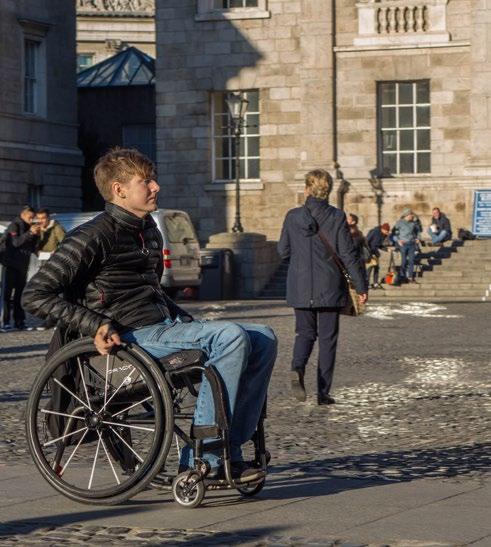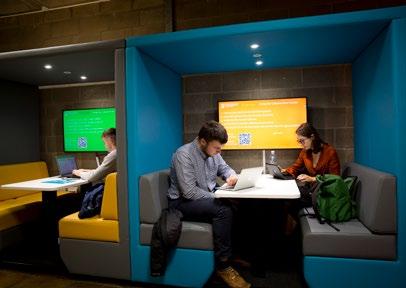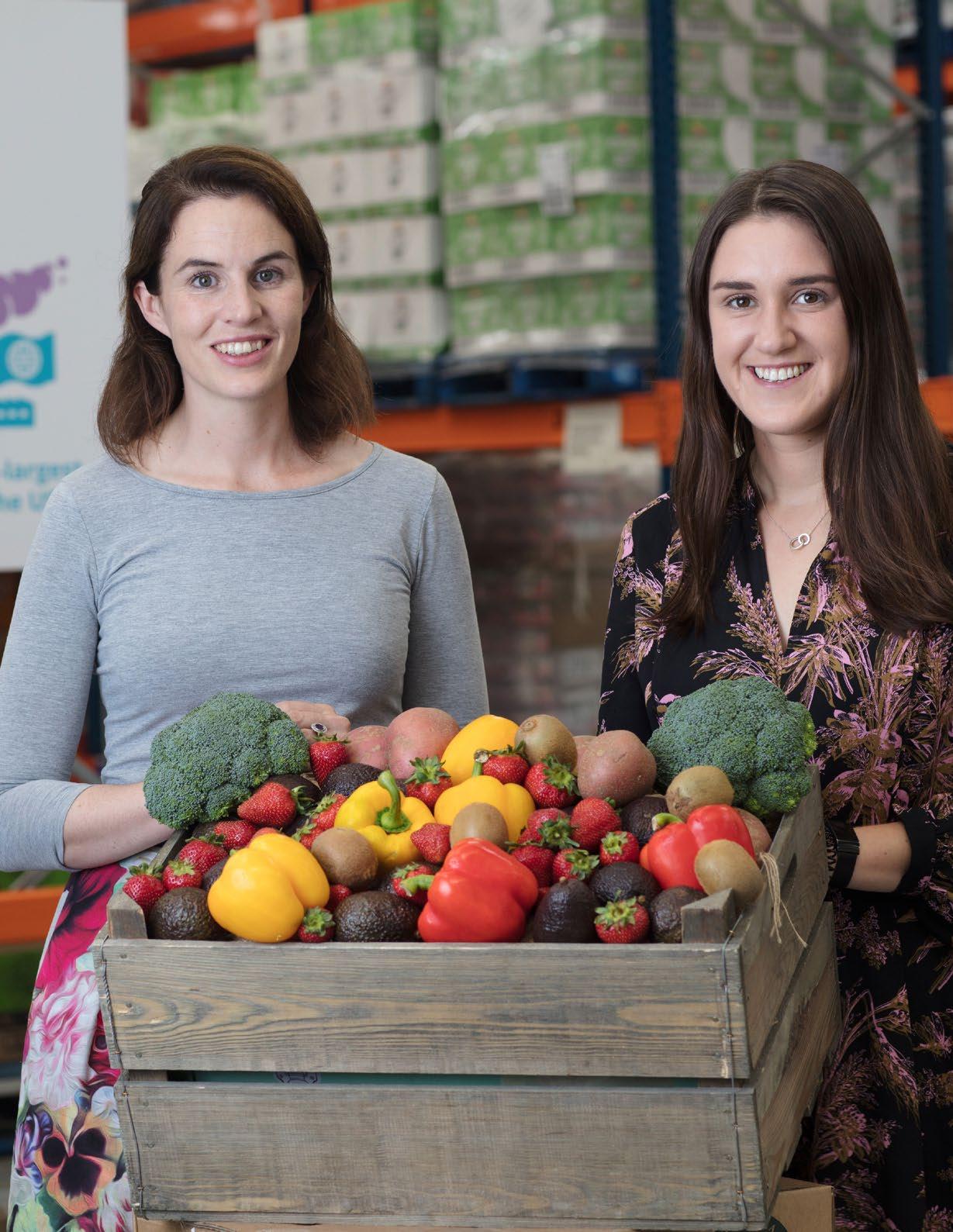
7 minute read
and industry engagement
from Provost & President's Retrospective Review 2011-21
by Public Affairs and Communications (PAC) - Trinity College Dublin
08


The Student Partnership Agreement annually presents the work being done to improve the student experience in partnership between the Dean of Students and the TCD Students’ Union (SU)/Graduate Students’ Union (GSU). The Dean of Students identifies student priorities annually and updated agreements are brought to Board and signed by the Provost, Vice-Provost/CAO, SU and GSU officers. The National Student Survey was introduced in 2012/13 and is a partnership between the Higher Education Authority, the Irish Universities Association, the Technological Higher Education Association and the Union of Students in Ireland. Feedback from the surveys is followed up through the School Action Plans, introduced for the first time in 2018/19. Healthy Trinity is a cross-university initiative involving over a hundred student partners, academic and professional services. One of its milestones in 2019 was the introduction of a tobacco-free policy which removed tobacco use from the entire campus, with three minor exceptions. The policy was introduced in partnership with the SU and GSU and supported by student-led campaigns. The student-led Plastic Solutions group presented to the Provost’s Advisory Committee on Sustainability and Low Carbon Living on the growing desire among the student population to eliminate disposable plastics across campus. This led to a plan to reduce and eliminate where possible, disposable plastics across campus. Student Services Trinity’s Student Services include pastoral and academic supports and services that support the learning environment. Some, such as the Tutorial Service, are longstanding; others like Orientation and the Global Room have been developed more recently. A Director of Student Services role introduced in 2017 provides an integrated approach to delivering and developing student services.
Disability Services Since its 10th anniversary in 2010 the Disability Service (DS) has grown exponentially, as numbers of students with disabilities rose from 818 in 2010/11 (5.4% of the total student population) to 1,722 in 2019/20 (9.4%) . Noteworthy developments include: the launch of the Unilink Service in 2010 to support students with mental health difficulties (renamed Occupational Therapy Supports in 2016); the establishment in 2015 of the Disability Service Student Ambassador Programme, now the Trinity Ability Co-op, a student-led move towards radical inclusion; the adoption of the Reasonable Accommodation Policy in 2018; and a variety of access works including accessible pathways on Front Square, wheelchairs lifts and enabled toilets.
Student Counselling Over the past 10 years Trinity has supported the mental health of students via the Student Counselling Services (SCS),
LEFT – Using the accessible pathways installed on Front Square. LEFT TOP – Students using their laptops in the Arts Building booths. LEFT BOTTOM – Enticing new members to societies during Freshers’ Week.
Student2Student (S2S), and Student Learning Development in the following ways: — services have seen 16,634 individual clients and offered 110,762 appointments in the last ten years. — instrumental in setting up the student partnership Consent framework. — Student Learning Development has set up an Academic writing centre, reaching 7,500 students in the past year. — The S2S Mentor programme extended from a pilot to a programme reaching all incoming undergraduate and visiting students (c.4,500 students annually). Volunteer recruitment and training has increased from c.120 to over 700 volunteers each year, and the programme is now intrinsic to Trinity's undergraduate orientation. Peer Support has also increased, offering over 100 hours annually.
College Health Service This service continues to grow and will move into a new purpose-built accommodation in Printing House Square in 2021, together with the Disability Service.
Student Accommodation Student Accommodation has been a challenge over the past 10 years with rising rents and fewer places available. In 2017 Trinity provided an additional 761 rooms in Kavanagh Court and Binary Hub; a further 250 will become available this year in Printing House Square and a further 16 in 2022 (Rubrics & Chief Stewards House).
Global Room The student experience has been a key focus of the Global Room since its establishment in 2013, and a core element of Trinity’s first Global Relations Strategy (2012). The team offers specialist advice to support the international student journey. An essential element is the inclusion of student voices through its Global Ambassador programme.
Careers Service The Careers Service is responsible for delivering on the College’s strategic objective of embedding employability and career development skills in the curriculum. A new Director of Careers started in September 2017 to lead on shaping the new strategic direction. Key initiatives introduced since then include a new College-wide online careers management portal (My Career), the Trinity Employability Award and the Laidlaw Undergraduate Leadership and Research Programme. Student participation Clubs and societies – There are over 50 sports clubs and over 120 societies, all student-led and managed. This year, even with Covid-19 restrictions, societies ran a host of daily activities. An incredible 9,100 individual students joined societies this year, cumulatively representing 26,704 unique society memberships.
Sustainability and civic engagement – Student participation in sustainability and civic engagement activities is encouraged and supported through committee membership, awards, bursaries and research. In the past three years, engagement has expanded significantly, with a record 235 environmentally themed events taking place in 2019 alone. Programmes include: — OneStepCloser voting platform: to date, 27,960 votes have been cast in ten voting campaigns on decisions impacting the campus. — Recycling Ambassadors training programme launched in Trinity Hall in 2018 has seen over 700 students participate. — Residents Sustainability Champions programme teaches campus residents about climate change, the biodiversity crisis and how their choices can make positive impacts. — Eight new subcommittees were established within the Green Campus Committee, to recruit students keen to participate in driving Trinity sustainability initiatives. Just under 100 have signed up. — Sustainability Fund – overseen by the Provost’s Advisory Committee on Sustainability – has received 35 applications for funding in the past two years and funded 14. — Collaboration with S2S mentors – S2S mentors receive the monthly Green Campus e-zine and are encouraged to send it to their mentees. Civic Engagement in Trinity includes both curricular and co- and extra-curricular activities. In 2021 Trinity became a member of University of Sanctuary and will use this network to work towards increasing the number of scholarships for people who are refugees and asylum seekers living in Ireland. The Dean of Students Awards for Volunteering are annual awards that acknowledge the contribution of student volunteers. In recognition of the wide range of volunteering and the commitments made by students over the past 10 years, there are now three categories of award, the Dean's List for Volunteering, the Dean's Leadership Award for Volunteering and the Trinity Legacy Award for Volunteering. Supportive, engaging and forward-thinking, Trinity wants the student experience to be the best it can be.
09
Dr Diarmuid O’Brien, Chief Innovation and Enterprise Officer
Trinity College Dublin is a university with innovation at its centre. Our academics have always understood the value of not just doing great research but translating that research to achieve impact that improves lives.
RIGHT – Aoibheann O’Brien and Iseult Ward, cofounders of social enterprise Foodcloud, participants in LaunchBox, Tangent’s Student Accelerator programme in 2013. (Photo credit: Patrick Bolger) Over the decades, Trinity has supported innovations that led to the nicotine patch and to the use of folic acid to support healthier pregnancies. We have helped create globally leading businesses – think Iona Technologies which was the fifth largest IPO in the history of the NASDAQ in 1997. However, in the last decade Trinity has expanded its ambitions and demonstrated that we can deliver even more impact. We have shown how a university can respond to both the challenges of society and the ambitions and talents of students and how research can lead, at scale, to innovation enabled businesses. This has not happened by accident. At the start of the decade, Trinity’s first innovation strategy was developed, launching initiatives which have helped make Trinity a European leader in innovation and entrepreneurship.
Student entrepreneurship Students today are motivated by making an impact and there is no more direct way to achieve this than to establish your own company. Trinity has responded to this changing landscape by establishing Tangent, Trinity’s Ideas workspace, to provide an opportunity for all students to take their innovative and entrepreneurial ideas and turn them into impact. Tangent runs a range of programmes that have transformed how we support innovation.











